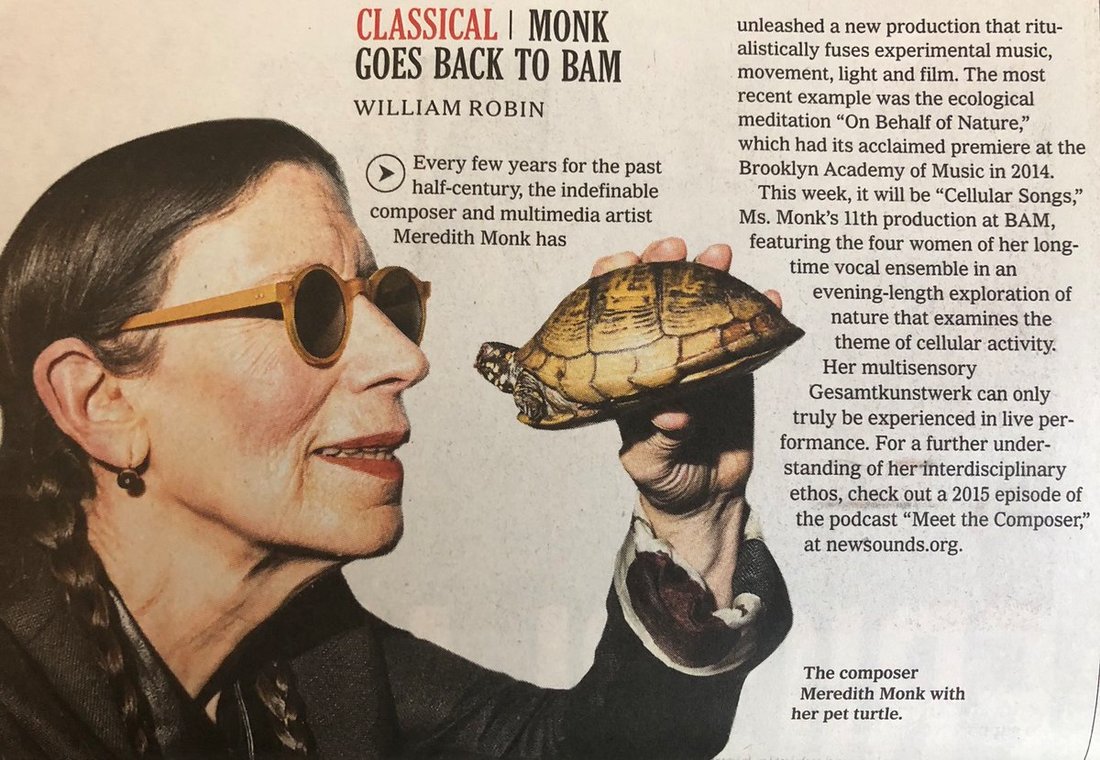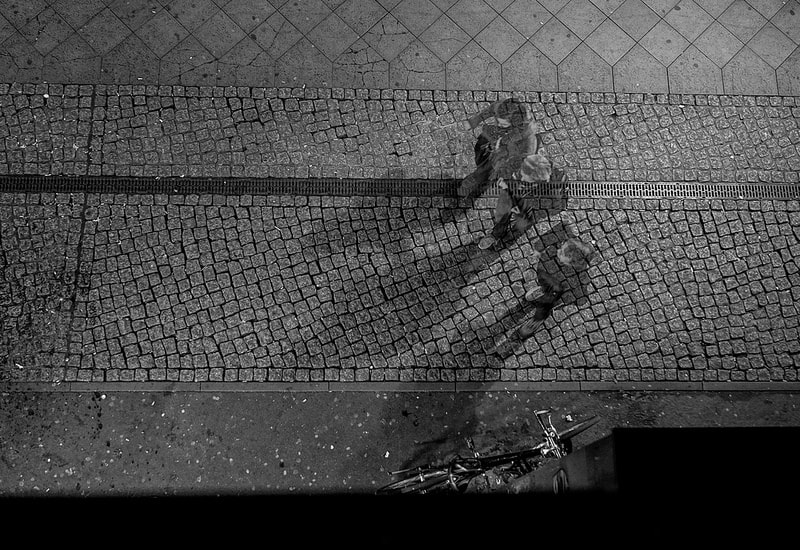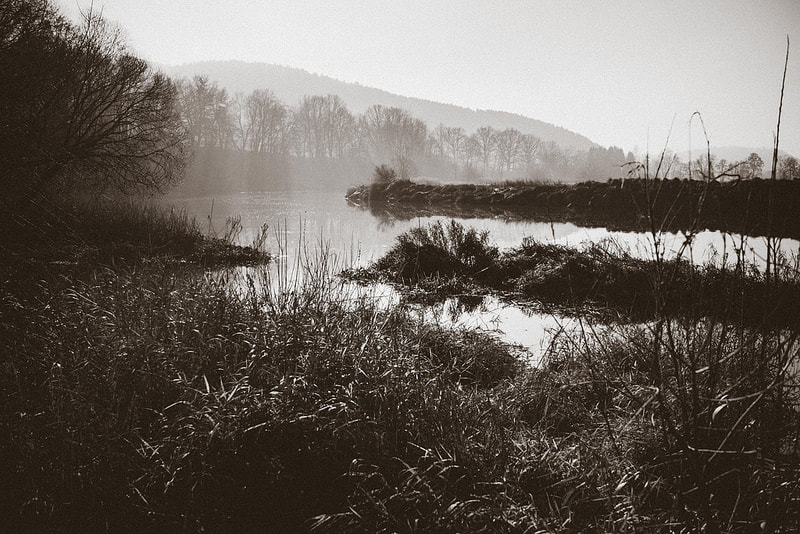All Musical Truth Resides in the Body
Meredith Monk's Art as Primal Theopoetics
|
|
Meredith Monk's Art as Theopoetics
|
Cellular Songs: Seeing What is Possible in Our World
Cellular Songs, musical forms evoke biological processes as layering, replication, division, and mutation in a “deeply affecting meditation on the nature of the biological cell as a metaphor for human society” (Financial Times). |
|
|
Meredith Monk in her studio |
Meredith Monk on CBS |
From the Meredith Monk (official) website:
MEREDITH MONK (b. November 20, 1942, New York, NY) is a composer, singer, director/choreographer and creator of new opera, music-theater works, films and installations. Recognized as one of the most unique and influential artists of our time, she is a pioneer in what is now called "extended vocal technique" and "interdisciplinary performance." Monk creates works that thrive at the intersection of music and movement, image and object, light and sound, discovering and weaving together new modes of perception. Her groundbreaking exploration of the voice as an instrument, as an eloquent language in and of itself, expands the boundaries of musical composition, creating landscapes of sound that unearth feelings, energies, and memories for which there are no words. Over the last fifty years, she has been hailed as "a magician of the voice" and "one of America’s coolest composers."...more
MEREDITH MONK (b. November 20, 1942, New York, NY) is a composer, singer, director/choreographer and creator of new opera, music-theater works, films and installations. Recognized as one of the most unique and influential artists of our time, she is a pioneer in what is now called "extended vocal technique" and "interdisciplinary performance." Monk creates works that thrive at the intersection of music and movement, image and object, light and sound, discovering and weaving together new modes of perception. Her groundbreaking exploration of the voice as an instrument, as an eloquent language in and of itself, expands the boundaries of musical composition, creating landscapes of sound that unearth feelings, energies, and memories for which there are no words. Over the last fifty years, she has been hailed as "a magician of the voice" and "one of America’s coolest composers."...more
|
More on Primal Theopoetics
Speaking of the Zen teacher Norman Fischer, Meredith Monk says: "We both come from a Jewish background, so we're both Jew-Bus, so we have that in common. He's been going back to actually teaching meditation for Jewish practitioners, you know, people who come from the Jewish tradition. He's teaching Jewish meditation, which is pretty great." This gives me on way of understanding her theopoetics. Theopoetics is a verb not a noun. It is the activity of exploring the fullness of life - its rawness, ugliness, pain, and pleasure, to quote Meredith Monk -- with honesty and courage, and with the aim of helping add a little healing. For process theologians this aim is a primal place -- a place where the embodied mind of the universe, and the deepest aspirations of the heart itself, come together. Together with God, from the depths of our own hearts and bodies, we co-love the world. Meredith Monk helps us explore these depths by exploring them herself. In this sense her art is an ongoing exploration in theopoetics. As she explores three forms of spirituality come together. The first is the prophetic imagination of Judaism with its twofold dynamic: imaging the world as it can be and ought to be, and attending to the injustices of the world as they have been and are. A second is attention to the primacy of the present moment as emphasized in Buddhism; with the present moment understood as a place where the past and present and future intersect. And a third is primality itself - where "isms" and "ologies" fall away and something more elemental, more turtle-like remains. |
Art as Healing Power
The Buddhist Side of Meredith Monk
"When Meredith first encountered Buddhism in the 1970s, a whole lot of things clicked into place. She learned to accept the moment for what it is, "in all it's rawness, ugliness, pain, pleasure." Meredith found that she had always known this as Meredith the Artist, but not as Meredith the Person. Buddhism allowed her to become whole, through all the twists and turns of a hard life pursuing art."
Exploring the Emotion of Fear
'Most of my songs deal with emotion, you could say, between the cracks of emotion. You know, they're not really dealing with a particular, you know, anger or something that you can point your finger at, but I usually think of them as the shades between the emotions, that the voice can dig those shades of emotion out. |
|
Interview with Krista Tippett in On Being
"Meredith Monk is a kind of archeologist of the human voice and body. And the woman we meet is also an archeologist of the mind and spirit, with a longtime Buddhist practice. Through music as through meditation, she pushes the boundaries of what we can do without words — reaching to places in human experience where words can get in the way."
Quotes from the Interview
"Singing together is very, very intimate, and I always say that the music or the images or anything are just a kind of armature for revealing the radiance of these performers...it's such an amazing template of the possibility of human behavior, of generosity and being there for the other person and, you know, being so sensitive to the environment and to the other people."
"I always think of the relationship between the audience and the performer as a kind of infinity sign or a figure eight of energy that goes from the performer to the audience and then back from the audience back to the performer, and it's just this constant flow of energy between these two bodies of people. But the beauty of a live performance is that we're all in the same space at the same time, and I don't think we have that many situations in the world like that."
"I think that actually all of us as human beings are part of the world vocal family. I like to think that all of us are part of that world vocal family. When you start exploring your voice, there are sounds that you find that do transcend a particular culture. You know, they're used in different ways in the culture, but they are sounds that are part of the vocabulary of the human voice, and the human voice is the original instrument. So you're going back to the very beginnings of utterance and I think that's why, when you hear it, it brings up — in a way it's like the memory of being a human being."














